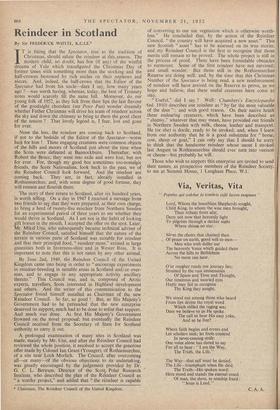Reindeer in Scotland
By Sir FREDERICK WHYTE, K.C.I.E.* IT is fitting that the Spectator, true to the tradition of Christmas, should salute the reindeer at this,season. The modern child, no doubt, has few (if any) of the wistful dreams of Yule which transfigured the Christmas Day of former times With something more than the stocking, and the half-crowns bestowed by rich uncles on their nephews and nieces. And, indeed, the half-crown that the Editor of the Spectator had from his uncle—dare I say, how many years ago ?—was worth having, whereas, today, the best of Treasury notes would scarcely fill the same bill. Moreover, do our young folk of 1952, as they lick from their lips the last flavour of the goodnight chocolate (see Peter Pan) wonder dreamily whether Father Christmas will drive his team of rei,ndeer across the sky and down the chimney to bring to them the good cheer of the season ? That lovely leg8nd is, I fear, lost and gone for ever. , None the less, the reindeer are coming back to Scotland, if not to the bedside of the Editor of the Spectator—worse luck for him ! These engaging creatures were common objects of the hills and -moors of Scotland just about the time when the Scots were defeated at Bannockburn. Thereafter, with Robert the Bruce, they went into exile and were lost; but not for ever. For, though my good but sometimes too-nostalgic friends, the Scots Nationalists, look back to the past, we of the Reindeer Council look forward. And the reindeer are coming back. They are, in fact, alreidy installed in Rothiemurchus; and, with some degree of good fortune, they will remain and flourish there.
The story of their return to Scotland, after six hundred years, is worth telling. On a day in 1947 I received a message from two friends to say that they were prepared, at their own charge, to bring a herd of twenty-five reindeer from Northern Sweden for an experimental period of three years to see whether they Would thrive in Scotland. As I am not in the habit of looking gift horses in the mouth, I accepted the offer on the spot. Later, Mr. Mikel Utsi, who subsequently became technical adViser of the Reindeer Council, satisfied himself that the nature of the terrain in various parts of Scotland was suitable for reindeer and that their principal food, " reindeer moss," existed in large quantities both in Inverness-shire and in Wester Ross. It is important to note that this is not eaten by any other animal.
By June 2nd, 1949, the Reindeer Council of the United Kingdom came into being in order to " encourage experiments in reindeer-breeding in suitable areas in Scotland and/or over- seas, and to engage in any appropriate activity ancillary thereto." This Council was, and is, composed of Arctic experts, travellers, Scots interested in Highland development and others. And the writer of this communication to the Spectator found himself installed as Chairman of the new Reindeer Council. So far, so good ! But, as His Majesty's Government had to be persuaded that the new enterprise deserved its support, much had to be done to enlist that support. And much was done. At first His Majesty's Government frowned on the novel proposal; but eventually the Reindeer Council received from the Secretary of State for Scotland authority to carry it out.
A prolonged examination of many sites in Scotland was made, mainly by Mr. Utsi, and after the Reindeer Council had reviewed the whole position, it resolved to accept the generous offer made by Colonel Ian Grant (Younger), of Rothiemurchus, of a site near Loch Morlich. The Council, after overcoming all—or many—of the obvious objections to its undertaking, was greatly encouraged by the judgement provided by Dr. G. C. L. Bertram, Director of the Scott Polar Research Institute, who described the plan of the Reindeer Council as " a worthy project," and added that " the reindeer is capable * Chairman, The Reindeer Council of the United Kingdom. C. A. A. of converting to our use vegetation which is otherwise worth- less." He concluded that, by the action of the Reindeer Council, " the country will have acquired a new asset." This new Scottish " asset " has to be assessed on its true merits; and my Reindeer Council is the first to recognise that those merits still remain to be proved. The whole project is still in the process of proof. There have been formidable obstacles to surmount. Some of the first reindeer have not survived; and small wonder. But those still in the Rothiemurchus Reserve are doing well; and, by the time that this Christmas Number of the Spectator is being read, a new reinforcement of reindeer will have arrived on the Reserve to prove, as we hope and believe, that these useful creatures have come to stay.
" Useful," did I say ? Well: Chambers's Encyclopaedia '(ed. 1910) describes our reindeer as by far the most valuable of the deer ": and with good reason. On their native heath these endearing creatures,. which have been described as clumsy," whatever that may mean, have provided our friends in Northern Sweden with milk, cheese, leather and transport. He (or she) is docile, ready to be stroked; and, when I learn from our authority that he is a good substitute for " horse, cow, sheep or goat," I can only say that I should be sorry to think that the handsome reindeer whose snout I stroked last August 'in Rothiemurchus should ever turn into venison or cheese—but probably he will.
Those who wish to support this enterprise are invited to send their names, as prospective members of the Reindeer Society, to me at Summit House, 1 Langham Place, W.1.










































































 Previous page
Previous page